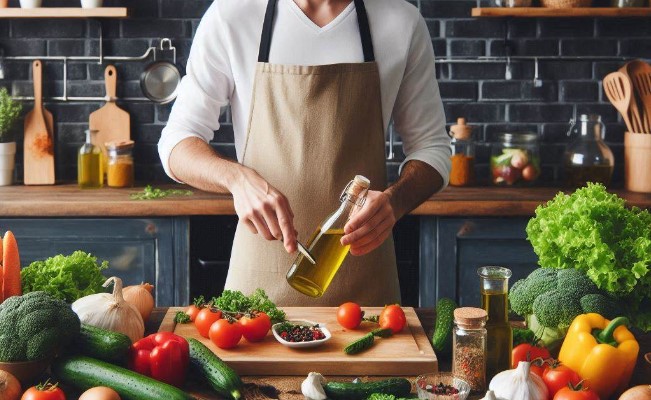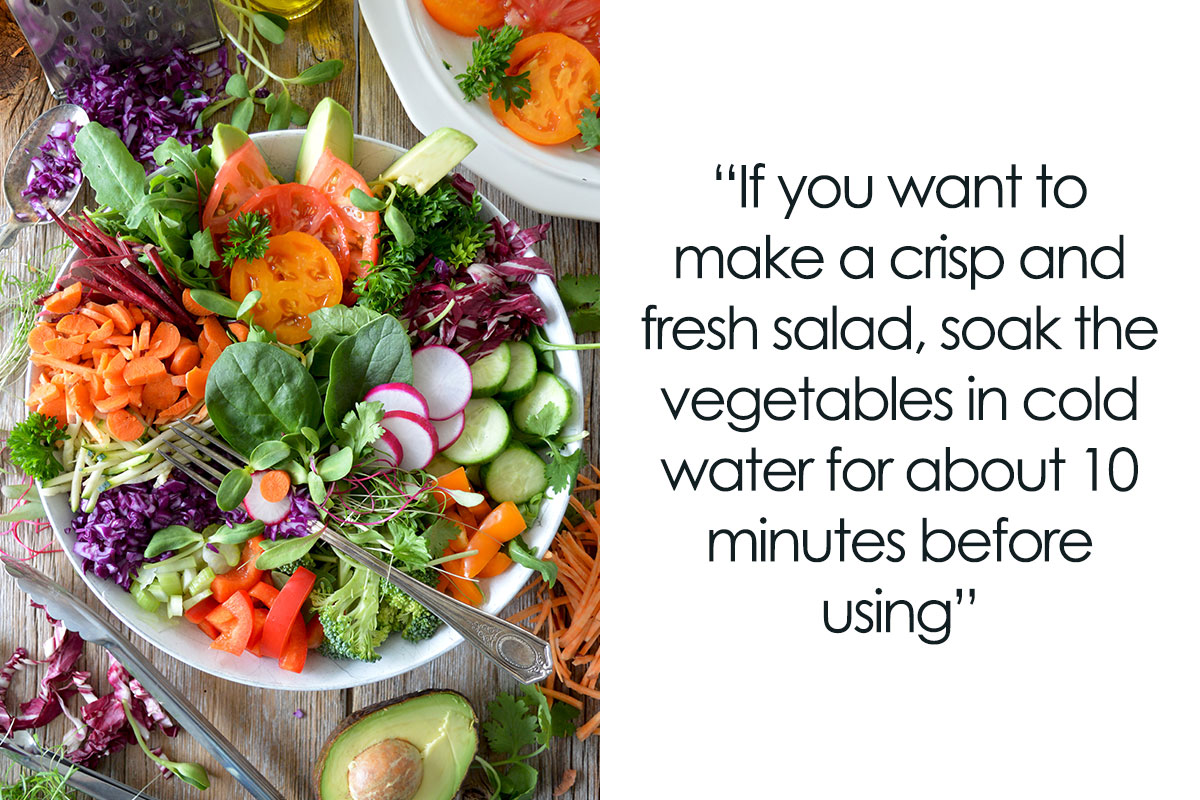Using extra virgin olive oil for cooking is not recommended because it has a low smoke point and can burn and break down at high temperatures. This can result in unpleasant flavors and the loss of beneficial nutrients, reducing its health benefits.
In my experience, I’ve found that using extra virgin olive oil is good for delicate dishes when you want to keep the oil’s flavor. For high-temperature cooking, use oils with high smoke points like refined olive oil, avocado oil, or grapeseed oil.
| Factor | Extra Virgin Olive Oil |
|---|---|
| Smoke Point | 320°F – 375°F (160°C – 190°C) |
| Monounsaturated Fat Content | ~73% |
| Polyphenol Content | 100-500 mg/kg |
| Suitable for High-Heat Cooking | No |
| Best Used For | Low-heat cooking, dressings, drizzling |

Extra virgin olive oil is highly valued for its rich flavor and numerous health benefits, including its high content of monounsaturated fats and antioxidants like polyphenols. However, these benefits come with a caveat: EVOO has a smoke point between 320°F to 375°F (160°C to 190°C). When you cook at or above this temperature, the oil begins to smoke and degrade, producing harmful compounds like free radicals and acrolein, which can impart a bitter taste to your food.
Moreover, the degradation of the oil also means that the nutritional advantages, such as the preservation of antioxidants, are significantly diminished. This makes extra virgin olive oil more suitable for low-heat cooking methods like sautéing or drizzling over finished dishes rather than high-heat cooking techniques like frying or searing.
Extra virgin olive oil (EVOO) is well-known for its many health benefits and is a staple in Mediterranean cuisine. However, when it comes to cooking, experts advise against using it due to its low smoke point and delicate flavor profile.
The smoke point of an oil is the temperature at which it starts to smoke and break down, releasing harmful compounds and altering its taste. While EVOO has a relatively low smoke point of around 375°F (191°C), it is best suited for uncooked or low-heat cooking methods.
Here are a few reasons why you should avoid cooking with extra virgin olive oil:
1. Low Smoke Point
Extra virgin olive oil has a relatively low smoke point, typically around 375°F (190°C). The smoke point is the temperature at which the oil begins to break down and produce smoke. When oil reaches this point, it starts to degrade, releasing harmful compounds, free radicals, and acrid smoke, which can negatively affect both the flavor and nutritional value of your food.
Why This Matters:
- Flavor Degradation: When EVOO overheats, its delicate, fruity, and peppery flavors can become burnt and bitter.
- Health Concerns: Overheating EVOO can destroy its beneficial antioxidants and healthy fats, reducing its nutritional benefits.
- Safety: Cooking at temperatures above the smoke point can produce toxic fumes and free radicals.

Credit: www.suncanihvar.com
2. Flavor Distortion
Extra virgin olive oil is prized for its robust, distinctive flavor, which can range from fruity to peppery, depending on the olive variety and production methods. While this flavor is a great addition to cold dishes, salads, and dips, it might not always complement the taste of the foods you’re cooking.
Why This Matters:
- Overpowering Taste: The strong flavor of EVOO can overpower more delicate ingredients, altering the intended taste of a dish.
- Flavor Changes: High heat can cause the flavor of EVOO to change, sometimes resulting in a taste that is less pleasant than when it’s used cold or at lower temperatures.
3. Nutritional Loss
Extra virgin olive oil is highly regarded for its health benefits, such as being rich in monounsaturated fats and antioxidants. However, when heated beyond its smoke point, these beneficial compounds can degrade or evaporate, leading to a loss of nutritional value.
Choosing to cook with oils that have a higher smoke point can help preserve the nutrients found in EVOO and maintain its health-promoting properties.
4. Cost Consideration
Extra virgin olive oil is often more expensive than other types of cooking oils, including virgin olive oil or refined oils. Using EVOO for high-heat cooking, where its unique flavor and health benefits may be lost, might not be the most cost-effective choice.
Why This Matters:
- Waste of Premium Oil: Cooking with EVOO at high temperatures may diminish the very qualities that make it worth the extra cost.
- Better Alternatives: For high-heat cooking, using a less expensive oil with a higher smoke point (like virgin olive oil or a refined olive oil) might be more economical.

Credit: www.boredpanda.com
When Can You Use Extra Virgin Olive Oil for Cooking?
Extra virgin olive oil (EVOO) is a versatile ingredient that, despite its lower smoke point, can be effectively used in various cooking methods when approached thoughtfully. Here’s a detailed look at when and how you can make the most of EVOO in your kitchen:
1. Low to Medium-Heat Cooking
Ideal Applications: Sautéing, pan-frying, and gentle stir-frying.
Why It Works:
- Temperature Control: EVOO is well-suited for cooking at temperatures below its smoke point, which is typically around 375°F (190°C). At these temperatures, EVOO retains its flavor and nutritional benefits.
- Flavor Enhancement: When used at lower temperatures, EVOO imparts a rich, fruity flavor to your dishes without the risk of burning or bitterness.
Tips for Use:
- Preheat Pan Gradually: Start with a moderate heat setting and allow the pan to preheat slowly to avoid overheating the oil.
- Monitor Heat: Keep an eye on the temperature to ensure it stays below the smoke point. Adjust the heat as needed to maintain a safe cooking temperature.
2. Cold Applications
Ideal Applications: Salad dressings, marinades, dips, and finishing oil.
Why It Works:
- Flavor Profile: EVOO’s robust and complex flavor is ideal for cold applications where it can be enjoyed in its pure form. Its taste can enhance salads, dips, and marinades without the risk of degradation.
- Nutritional Benefits: Using EVOO in cold applications preserves its antioxidants, healthy fats, and overall nutritional value.
Tips for Use:
- Drizzle or Mix: Use EVOO to drizzle over dishes like roasted vegetables or grilled meats for added flavor. Mix it into dressings or dips to provide a flavorful base.
- Experiment with Flavors: Combine EVOO with herbs, garlic, or citrus for enhanced flavor profiles in your cold dishes.
3. Quick Searing
Ideal Applications: Searing meats, fish, or vegetables briefly at medium heat.
Why It Works:
- Quick Cooking: When searing, the oil is exposed to high heat for a short duration, which reduces the risk of reaching its smoke point.
- Flavor Preservation: Quick searing helps preserve the flavor of EVOO while still allowing it to impart a subtle richness to the food.
Tips for Use:
- Preheat Pan: Ensure the pan is preheated before adding EVOO and food to achieve a good sear.
- Monitor Closely: Be vigilant and avoid leaving the oil on high heat for too long to prevent it from burning.
Additional Considerations
- Blending Oils: If you need to cook at higher temperatures but still want the flavor of EVOO, consider blending it with a higher smoke point oil, such as canola or grapeseed oil. This can help increase the overall smoke point while still retaining some of the EVOO flavor.
- Use in Baking: EVOO can also be used in baking to replace butter or other oils. Its distinct flavor can complement certain baked goods, like focaccia or savory bread.
What Is the Smoke Point of Extra Virgin Olive Oil?
The smoke point of extra virgin olive oil is around 375-410°F (190-210°C). This is the temperature at which the oil begins to smoke and break down, potentially releasing harmful compounds. While this smoke point is lower than some other cooking oils, it is still sufficient for most low to medium-heat cooking techniques. Avoid using EVOO for high-heat cooking, such as deep frying, where oils with higher smoke points, like avocado oil, may be more appropriate.
Does Cooking With Extra Virgin Olive Oil Destroy Its Nutrients?
Cooking with extra virgin olive oil does not completely destroy its nutrients, but it can reduce some of its health benefits if used at very high temperatures. EVOO is rich in monounsaturated fats and antioxidants, which are sensitive to heat. To preserve its nutritional value, it’s best to use EVOO for low to medium-heat cooking, or add it to dishes after cooking.
What Are the Best Cooking Methods for Extra Virgin Olive Oil?
Extra virgin olive oil is best suited for low to medium-heat cooking methods. Sautéing, light frying, and baking are excellent ways to use EVOO without risking its delicate flavor and nutrients. It’s also perfect for drizzling over finished dishes, making dressings, or marinating foods. Avoid using it for high-heat methods like deep frying, as this can degrade its quality.
Is Extra Virgin Olive Oil Safe for Frying?
While extra virgin olive oil can be used for light frying, it is not the best choice for deep frying due to its relatively low smoke point. For shallow frying or sautéing, EVOO works well and adds a rich flavor to the dish. However, for deep frying or prolonged cooking at high temperatures, consider using oils with higher smoke points, such as peanut or sunflower oil, to prevent the oil from burning.
Does Cooking With Extra Virgin Olive Oil Affect Its Taste?
Cooking with extra virgin olive oil can slightly alter its taste, especially if exposed to high heat. EVOO has a distinctive flavor profile, often described as fruity or peppery, which can become muted or bitter when overheated. To retain its unique taste, use EVOO in dishes that require lower temperatures or add it at the end of the cooking process.
Can You Use Extra Virgin Olive Oil for Baking?
Yes, extra virgin olive oil can be used for baking. It’s a healthier alternative to butter or margarine and can add a subtle, pleasant flavor to baked goods. EVOO is especially good in recipes that call for moist textures, such as cakes, muffins, and bread. Just be mindful of its strong flavor, which might not be suitable for all types of baked goods.
Is It Better to Use Extra Virgin Olive Oil Raw?
Using extra virgin olive oil raw, such as drizzling it over salads, pasta, or vegetables, is one of the best ways to enjoy its full flavor and health benefits. Raw EVOO retains all its antioxidants and nutrients, making it a superior choice for enhancing the taste and nutritional profile of your dishes. However, it can also be used in cooking, as long as it’s done carefully to avoid overheating.
Final Thoughts
While extra virgin olive oil is a fantastic choice for salads, dressings, and low-heat cooking methods, it is best avoided for high-temperature cooking. Its low smoke point and delicate flavors are not suited for frying, searing, or other high-heat applications.
By understanding the limitations of different oils and choosing the right one for each cooking method, you can ensure that your dishes are flavorful and nutritious.
Remember: Save your extra virgin olive oil for dishes where its exquisite flavor and health benefits can truly shine!

I may be a little “crazy” when it comes to cooking, but I enjoy every minute of it. Spending time in the kitchen itself, whether with my family or my friends, brings me both happiness and exhilaration. This blog was created to showcase my cooking/eating with family and friends. And also as an opportunity to discuss ideas on food and the culinary circle in general.




